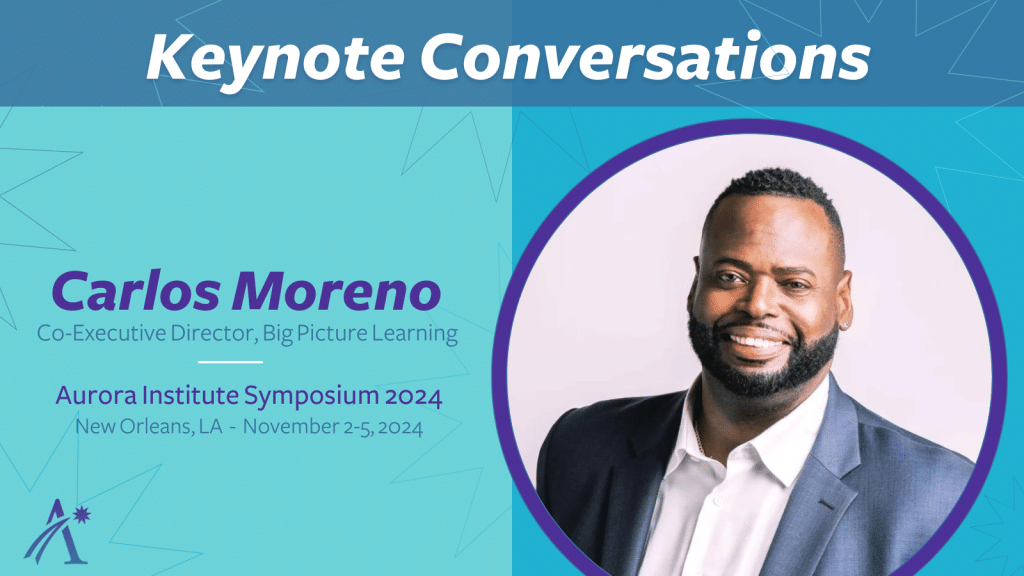In Conversation With Carlos Moreno, Co-Executive Director of Big Picture Learning and Aurora Institute Symposium 2024 Keynoter
CompetencyWorks Blog
Aurora’s Communications Director Chiara Wegener recently had the chance to sit down with Big Picture Learning’s Carlos Moreno, who will be leading a keynote panel of young people at the Aurora Institute Symposium 2024 in New Orleans this November.

CW: It’s great to be talking with you today, Carlos. Could you share a bit more with us about Big Picture Learning’s vision and work?
CM: Our vision centers around creating spaces where young people can fully inform and design their learning experiences. Specifically, we want young people to feel as though they can lead lives of their own design. For us, that primarily happens within the context of schools, but we also focus on ensuring that young people have really powerful and meaningful experiences to explore outside of school walls. We want to ensure that learners can make the connection between what they’re doing in schools and the real world. All of our work is in service of helping young people, schools, and communities realize the power and potential of student-centered education.
CW: Could you share a bit more about you, personally and professionally, and what led you to Big Picture?
CM: I’m very much a non-traditional route educator. Coming out of high school, and even undergrad, I had no interest in being an educator – at least not in the conventional sense. I had pretty traumatic experiences as a high schooler. Like so many young people, when I entered the K-12 system I was excited; learning felt engaging and relevant. But then I hit middle school, and that’s where I started to feel more disengaged and less excited about school. So by the time I got to high school, it was more about compliance and ensuring that I remained eligible to play sports. I didn’t have many teachers who I felt cared about the person I was or my life outside of school. I think this was partially because of the ways that schools are designed. It was these experiences that led me to Big Picture – a place that cultivates engagement, caring, and personalized learning for young people and their families in a much more holistic way.
CW: I know folks will learn more about your book, Finding Your Leadership Soul, at Symposium, but I am wondering if you could share a bit more with us. There’s a part of the book where you’re talking about an incident in your childhood – the traumatic experience you mentioned before – where your beloved Bengals jacket was stolen off of your back. What lessons do you think that story holds for creating more loving and inclusive learning environments for young people?
CM: I wasn’t the first kid to have something stolen from them. What was really traumatizing for me was the violent and very public way that it happened, right outside of my school. A bus full of my peers stopped right in front of the incident and had front row seats to it. I think part of what was so painful was that the incident happened in a place where I gave so much of myself – I was a good student, an athlete, involved in clubs. And no one took a minute to check in with me to see if I was really okay – and I wasn’t. I was a very different young person when I returned to school. I use this story in my book to introduce readers to this commitment that I have, and that Big Picture has, of what it means to show up for young people in a different sort of way. It’s about caring for young people beyond content, beyond performance; it’s about caring for them as humans. Only then can we get to all of the other things.
CW: Could you give our network a bit of a preview of what they can expect from your Symposium keynote conversation? I know you’ll be joined by three amazing young people!
CM: This is going to be an amazing conversation with a middle schooler, high schooler, and a recent graduate. We’re going to be talking about their experiences with school – the good and the bad. We’re going to hear their ideas about what transforming education should look like. There’s going to be some humor, but it’s going to be a real conversation about their experiences and ideas.
CW: As you know, Aurora focuses on transforming education systems through personalized, competency-based education. I’m curious from where you sit, how you see this work as an equity lever?
CM: We’re kindred spirits in so many ways! When we talk about personalization, it starts with understanding the individual. The human interaction between people is so important. I don’t want to ever lose sight of that. When we think about allowing young people to demonstrate what they know and what they’ve learned in different ways, we shouldn’t be surprised when they routinely outperform our expectations. We all have our nuances and our differences around how we learn best and how we communicate. Why shouldn’t we be able to do that for young people?